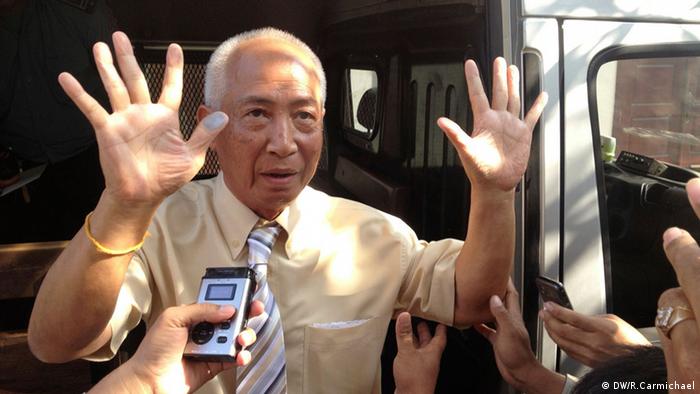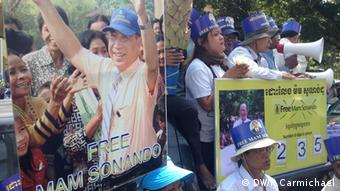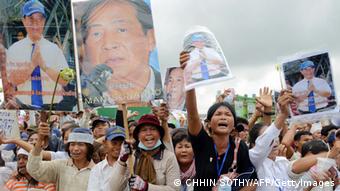Deutsche Welle

Prosecutors at the Appeal Court in Phnom Penh have dropped two serious
charges against the prominent government critic Mam Sonando (pictured). The
independent broadcaster had been accused of inciting insurrection.
Cambodia's courts have a well-earned reputation for doing the
executive's bidding, and in recent years numerous charges against
government critics and rights defenders have been criticized as acts of
state-directed intimidation.
However, few of those cases have raised eyebrows quite as much as the conviction of Mam Sonando, the owner of Beehive Radio, who was locked up on the grounds that he had masterminded a movement to break away from Cambodia.
The case against Mam Sonando followed a violent crackdown in May by hundreds of security forces against villagers protesting the loss of their land to a well-connected private company in northeastern Kratie province. Some of the villagers were members of Mam Sonando's democracy and rights group called the Association of Democrats. During the eviction, the authorities shot dead a 14-year-old girl but have since refused to investigate her killing.
Some observers also believe part of the reason for Mam Sonando's conviction lies elsewhere. In June, Prime Minister Hun Sen accused the journalist of secession just a day after Beehive Radio - one of the few critical voices in the broadcast media landscape - ran a story by Mam Sonando from the International Criminal Court at The Hague.
In that story, Mam Sonando reported that the US-based Khmer People Power Movement had filed a case accusing Cambodian officials of crimes against humanity for the plague of evictions that over the past decade has seen hundreds of thousands of ordinary people lose their land to powerful vested interests. Vast tracts of land have been handed over to private interests in an opaque process that has dispossessed and impoverished rural Cambodians.
Change of tactic
After the lower court jailed Mam Sonando for 20 years in October, UK-based rights group Amnesty International declared him a prisoner of conscience. The case also caught the eye of US President Barack Obama, who raised it with Hun Sen during his visit to Cambodia in November last year.
This week's two-day appeal hearing was attended by diplomats from several embassies as well as rights workers. Hundreds of Mam Sonando's supporters, many of them elderly, held a spirited vigil outside the court. Ou Virak, the president of the Cambodian Center for Human Rights (CCHR), said the attention seemed to have forced the government's hand.
"I think the government realized that they don't have a case, and they would look ridiculous to public opinion and also the international community," he said, adding that the prosecution's decision to ditch the two most serious charges - insurrection and inciting people to take up arms against the state - was "a good sign, and that's as good as it gets in a Cambodian court."
"But they will always find charges that will [legitimize] their incarceration of Mr. Mam Sonando," he said. "You will see a guilty verdict of some sort [on March 14] with a sentence of some sort, but the best you can hope for is a sentence that will match the number of days he's been in prison."
Although the prosecution admitted at the appeal hearing that there was little evidence that Mam Sonando had in fact been involved in insurrection, it did retain the charge of obstructing the authorities, which is punishable by up to a year in prison. It also added a charge of forest crime, which carries a tariff of up to 10 years.
Courtroom dealings
In court this week, Mam Sonando rejected all the charges outright. As he returned to prison, where he has spent eight months, he told reporters that he was confident the three-judge bench would hand down the correct verdict and set him free when they rule on March 14, and he thanked his supporters.
Amnesty International's country researcher, Rupert Abbott, said Mam Sonando had been jailed "because he is a prominent journalist who has broadcasts which have criticized the government, and this is an attempt to silence him."
"We would hope all of the convictions are overturned and that he's released unconditionally," he said.
Abbott added that it was "outrageous" that none of the seven witnesses whose original testimony had seen Mam Sonando jailed had appeared in court.
"The evidence was really based on what those witnesses were saying," Abbott said, pointing out that the witnesses had struck a deal with the lower court whereby they avoided prison in exchange for testifying against Mam Sonando.
"So the fact that they did not turn up and the fact that the defense did not have an opportunity to cross-examine them and show the inconsistencies in what they'd said was very disappointing," he said. "The defense asked for those testimonies to be thrown out, and I think that they have a very strong case for that."
Co-defendants
Mam Sonando was one of three defendants in this week's appeal hearing. The other two, who are from Kratie where May's violent eviction took place, also maintained their innocence. Touch Siem and Kan Sovan were found guilty last year of involvement in the so-called secessionist movement and jailed for five and three years respectively.
Ou Virak said the prosecution's decision to drop the insurrection charges meant Touch Siem and Kan Sovan should be acquitted and released too.
Ou Virak also noted that the witnesses who last year had been accused of being the ringleaders of the insurrection movement, and around whom the prosecution had built its original case against Mam Sonando, had escaped punishment.
"In fact two of them got deals and even housing and more goodies from the government, and they're supposed to be the ringleaders," he said. "There's no justice in any of this stuff."
However, few of those cases have raised eyebrows quite as much as the conviction of Mam Sonando, the owner of Beehive Radio, who was locked up on the grounds that he had masterminded a movement to break away from Cambodia.
The case against Mam Sonando followed a violent crackdown in May by hundreds of security forces against villagers protesting the loss of their land to a well-connected private company in northeastern Kratie province. Some of the villagers were members of Mam Sonando's democracy and rights group called the Association of Democrats. During the eviction, the authorities shot dead a 14-year-old girl but have since refused to investigate her killing.
Some observers also believe part of the reason for Mam Sonando's conviction lies elsewhere. In June, Prime Minister Hun Sen accused the journalist of secession just a day after Beehive Radio - one of the few critical voices in the broadcast media landscape - ran a story by Mam Sonando from the International Criminal Court at The Hague.
In that story, Mam Sonando reported that the US-based Khmer People Power Movement had filed a case accusing Cambodian officials of crimes against humanity for the plague of evictions that over the past decade has seen hundreds of thousands of ordinary people lose their land to powerful vested interests. Vast tracts of land have been handed over to private interests in an opaque process that has dispossessed and impoverished rural Cambodians.
Some 500 supporters gathered outside the Appeal Court in Phnom Penh for the two-day hearing
The UN special rapporteur on Cambodia, Surya Subedi, spoke out
last year against the process surrounding economic land concessions and
against the government's use of the courts to harass and intimidate
people standing up for their rights, which he said was a breach of
Cambodian law and its international commitments.Change of tactic
After the lower court jailed Mam Sonando for 20 years in October, UK-based rights group Amnesty International declared him a prisoner of conscience. The case also caught the eye of US President Barack Obama, who raised it with Hun Sen during his visit to Cambodia in November last year.
This week's two-day appeal hearing was attended by diplomats from several embassies as well as rights workers. Hundreds of Mam Sonando's supporters, many of them elderly, held a spirited vigil outside the court. Ou Virak, the president of the Cambodian Center for Human Rights (CCHR), said the attention seemed to have forced the government's hand.
"I think the government realized that they don't have a case, and they would look ridiculous to public opinion and also the international community," he said, adding that the prosecution's decision to ditch the two most serious charges - insurrection and inciting people to take up arms against the state - was "a good sign, and that's as good as it gets in a Cambodian court."
"But they will always find charges that will [legitimize] their incarceration of Mr. Mam Sonando," he said. "You will see a guilty verdict of some sort [on March 14] with a sentence of some sort, but the best you can hope for is a sentence that will match the number of days he's been in prison."
Although the prosecution admitted at the appeal hearing that there was little evidence that Mam Sonando had in fact been involved in insurrection, it did retain the charge of obstructing the authorities, which is punishable by up to a year in prison. It also added a charge of forest crime, which carries a tariff of up to 10 years.
Courtroom dealings
In court this week, Mam Sonando rejected all the charges outright. As he returned to prison, where he has spent eight months, he told reporters that he was confident the three-judge bench would hand down the correct verdict and set him free when they rule on March 14, and he thanked his supporters.
Amnesty International's country researcher, Rupert Abbott, said Mam Sonando had been jailed "because he is a prominent journalist who has broadcasts which have criticized the government, and this is an attempt to silence him."
"We would hope all of the convictions are overturned and that he's released unconditionally," he said.
Abbott added that it was "outrageous" that none of the seven witnesses whose original testimony had seen Mam Sonando jailed had appeared in court.
"The evidence was really based on what those witnesses were saying," Abbott said, pointing out that the witnesses had struck a deal with the lower court whereby they avoided prison in exchange for testifying against Mam Sonando.
"So the fact that they did not turn up and the fact that the defense did not have an opportunity to cross-examine them and show the inconsistencies in what they'd said was very disappointing," he said. "The defense asked for those testimonies to be thrown out, and I think that they have a very strong case for that."
Co-defendants
Mam Sonando was one of three defendants in this week's appeal hearing. The other two, who are from Kratie where May's violent eviction took place, also maintained their innocence. Touch Siem and Kan Sovan were found guilty last year of involvement in the so-called secessionist movement and jailed for five and three years respectively.
Ou Virak said the prosecution's decision to drop the insurrection charges meant Touch Siem and Kan Sovan should be acquitted and released too.
Ou Virak also noted that the witnesses who last year had been accused of being the ringleaders of the insurrection movement, and around whom the prosecution had built its original case against Mam Sonando, had escaped punishment.
"In fact two of them got deals and even housing and more goodies from the government, and they're supposed to be the ringleaders," he said. "There's no justice in any of this stuff."



1 comment:
Mam sonando,should have lived in Paris, as he already has a good life in France,with good democracy, good justices system, no corruption,
i feel bad for him, however he was deserved to be in jail for along time (faked man/bad man)
Post a Comment